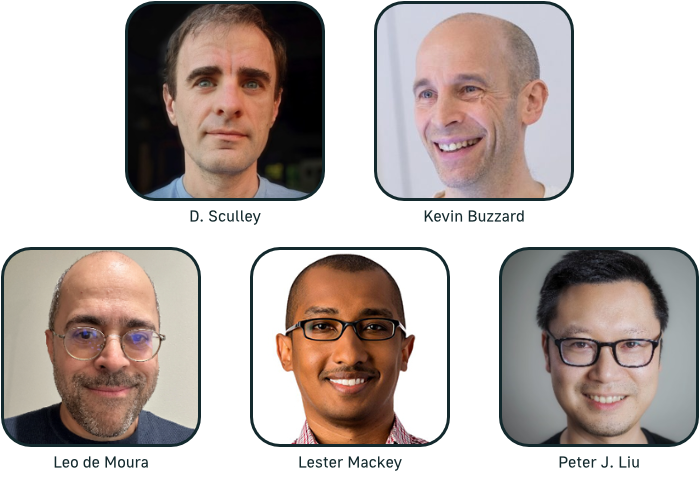
☰
AIMO Prize Appoints Further Advisory Committee Members
D. Sculley, Kevin Buzzard, Leo de Moura, Lester Mackey and Peter J. Liu appointed to the advisory committee for the Artificial Intelligence Mathematical Olympiad Prize.

XTX Markets is delighted to announce the appointment of five further advisory committee members. This group brings great expertise in machine learning, including D. Sculley, the CEO of Kaggle; Lester Mackey, a Principal Researcher at Microsoft Research and a Macarthur Fellow; and Peter J. Liu, a research scientist at Google DeepMind.
Prolific mathematicians Kevin Buzzard, who achieved a perfect score in the International Mathematical Olympiad, and Leo De Moura who is the Chief Architect for Lean, the automated reasoning tool, also join the advisory group.
They join the existing advisory committee members Terence Tao and Timothy Gowers, both winners of the Fields Medal, as well as Dan Roberts, Geoff Smith and Po-Shen Loh.

The AIMO Advisory Committee will support the development of the AIMO Prize, including advising on appropriate protocols and technical aspects, and designing the various competitions and prizes.
Simon Coyle, Head of Philanthropy at XTX Markets, commented:
"We are thrilled to complete the AIMO Advisory Committee with the appointments of D., Kevin, Leo, Lester and Peter. Together, they have enormous experience in machine learning and automated reasoning and are already bringing expertise and wisdom to the AIMO Prize. We look forward to announcing the winners of the AIMO's first Progress Prize soon, and then publicly sharing the AI models to support the open and collaborative development of AI."
Advisory Committee member profiles
D. Sculley
D. is the CEO at Kaggle. Prior to joining Kaggle, he was a director at Google Brain, leading research teams working on robust, responsible, reliable and efficient ML and AI. In his career in ML, he has worked on nearly every aspect of machine learning, and has led both product and research teams including those on some of the most challenging business problems.
Some of his well-known work involves ML technical debt, ML education, ML robustness, production-critical ML, and ML for scientific applications such as protein design.
Kevin Buzzard
Kevin a professor of pure mathematics at Imperial College London, specialising in algebraic number theory. As well as his research and teaching, he has a wide range of interests, including being Deputy Head of Pure Mathematics, Co-Director of a CDT and the department's outreach champion. He is currently focusing on formal proof verification, including being an active participant in the Lean community. From October 2024, he will be leading a project to formalise a 21st century proof of Fermat's Last Theorem.
Before joining Imperial, some 20 years ago, he was a Junior Research Fellow at the University of Cambridge, where he had previously been named 'Senior Wrangler' (the highest scoring undergraduate mathematician). He was also a participant in the International Mathematical Olympiad, winning gold with a perfect score in 1987. He has been a visitor at the IAS in Princeton, a visiting lecturer at Harvard, has won several prizes both for research and teaching, and has given lectures all over the world.
Leo de Moura
Leo is a Senior Principal Applied Scientist in the Automated Reasoning Group at AWS. In his spare time, he dedicates himself to serving as the Chief Architect of the Lean FRO, a non-profit organization that he proudly co-founded alongside Sebastian Ullrich. He is also honoured to hold a position on the Board of Directors at the Lean FRO, where he actively contributes to its growth and development. Before joining AWS in 2023, he was a Senior Principal Researcher in the RiSE group at Microsoft Research, where he worked for 17 years starting in 2006. Prior to that, he worked as a Computer Scientist at SRI International. His research areas are automated reasoning, theorem proving, decision procedures, SAT and SMT.
He is the main architect of several automated reasoning tools: Lean, Z3, Yices 1.0 and SAL. Leo's work in automated reasoning has been acknowledged with a series of prestigious awards, including the CAV, Haifa, and Herbrand awards, as well as the Programming Languages Software Award by the ACM. Leo's work has also been reported in the New York Times and many popular science magazines such as Wired, Quanta, and Nature News.
Lester Mackey
Lester Mackey is a Principal Researcher at Microsoft Research, where he develops machine learning methods, models, and theory for large-scale learning tasks driven by applications from climate forecasting, healthcare, and the social good. Lester moved to Microsoft from Stanford University, where he was an assistant professor of Statistics and, by courtesy, of Computer Science. He earned his PhD in Computer Science and MA in Statistics from UC Berkeley and his BSE in Computer Science from Princeton University.
He co-organized the second place team in the Netflix Prize competition for collaborative filtering; won the Prize4Life ALS disease progression prediction challenge; won prizes for temperature and precipitation forecasting in the yearlong real-time Subseasonal Climate Forecast Rodeo; and received best paper, outstanding paper, and best student paper awards from the ACM Conference on Programming Language Design and Implementation, the Conference on Neural Information Processing Systems, and the International Conference on Machine Learning. He is a 2023 MacArthur Fellow, a Fellow of the Institute of Mathematical Statistics, an elected member of the COPSS Leadership Academy, and the recipient of the 2023 Ethel Newbold Prize.
Peter J. Liu
Peter J. Liu is a Research Scientist at Google DeepMind in the San Francisco Bay area, doing machine learning research with a specialisation in language models since 2015 starting in the Google Brain team. He has published and served as area chair in top machine learning and NLP conferences such as ICLR, ICML, NEURIPS, ACL and EMNLP.
He also has extensive production experience, including launching the first deep learning model for Gmail Anti-Spam, and using neural network models to detect financial fraud for top banks. He has degrees in Mathematics and Computer Science from the University of Toronto.
See also: committee member profiles announced in February 2024